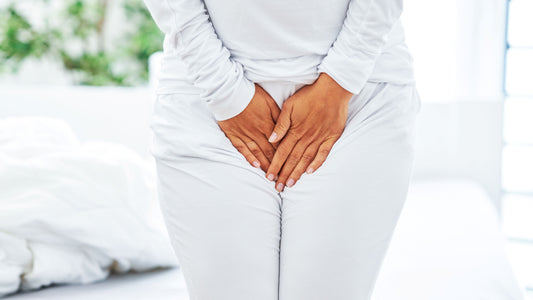In This Post You’ll Learn:
- Why sexual interest gets diminished or lost
- 3 tips to physically help your body heal and open up to feeling sexy and playful again
- The impact of hormones on your sex life, and what to do about it
- Kathy’s journey to finding the perfect solution for a passionate marriage (I share her discovery process with you)
- The proper way to do kegels that will really make a difference to your lady bits
Ladies, today I want to talk about something that seems to be a prevailing fear among us regarding our sex lives as we grow older, and it is this:
Our sex lives will become non-existent during and after menopause #MenopauseMYTH
In fact, I would like it to be true that post-menopause we can even have more fulfilling intimacy and a satisfying sex life than ever before!
I’ve worked with thousands of women over the years, and I’ve had the privilege of listening to their stories. I understand the frustration many people feel over the loss of libido, loss of passion, the feelings of loneliness from lack of connection, and perhaps even guilt and shame for not wanting or being able to have sex.
I’ve heard women tell me, “I love my partner, but I just don’t feel like having sex. What’s wrong with me?” Women of all ages, in their 30s, 40s, and 50s+, who feel they’ve lost their “sexual spark” desperately want it back. Many suffer in silence, not knowing that there are solutions out there.
After listening to all these stories here’s a little of what I’ve learned:
- First of all, let me just say, a non-existent sex life after menopause is a myth. (so let’s just end this myth right here and now),
- Reigniting your passion is a lot more nuanced than just doing any one thing,
- Losing your libido and passion does not mean you no longer love each other,
- Our bodies are changing, and many times what used to work just doesn’t cut it anymore,
- Some women do not experience any change in libido and lubrication (lucky ladies!),
- Many women report being “good to go” once they get started,
- Keeping the intimacy going is as important as having sex (and might even lead to more sex) and;
- The women who persist in looking for a solution will find one.
The good news is, you don’t have to settle for a sexless marriage.
[What is a sexless marriage? According to some resources it is having sex less than 10 times per year.]
It is absolutely possible to increase your desire, get more arousal, and climax during sex at any stage of your life. I can’t stress this enough.
Did you know that 94% of couples believe that sex is integral to marital health and happiness yet only 24% are actively working to improve and maintain their sex lives?
In fact, to drive my point home, I’d like to introduce you to a past client of mine, Kathy. Here’s what she had to say to me:
“I’m still sexually active. I’m having sex at least once a week, even at 71.” — Kathy Weibel, 71

Kathy wasn’t always as sexually active, in fact, she had the same worries as you do. She was in a loving, sexually healthy relationship and was desperate to keep the fire going. I’ll get to Kathy’s story and how she reignited her fire a little later in this article, but first I want to talk to you about menopause and sex.
Symptoms that come with menopause like vaginal dryness and lack of libido are all too real, but it doesn’t have to be that way. I have dedicated a third of my life doing research about sexual health.
And it is my calling to serve and share this knowledge.
This is a two-part post because one post is not going to cover all that I’d like to share with you. In this post, we’ll explore the physical side of sexuality, the body, why your libido wanes, and what you can do about it. In the next post, we will focus more on intimacy.
I’m going to start by explaining what happens to our body near and after menopause that affects our libido and risks destroying our ability to enjoy sexual intimacy with our partner.
Hormones. Hormones? Hormones!
Yes! Most of all the changes we experience start with our hormones! I’ve mentioned this before and I’ll say it again, our main sex hormones are androgens (DHEA and testosterone), estrogen, and progesterone.
During the menopausal transition, falling levels of estrogen can reduce desire in women (among other things). Estrogen promotes the health of our reproductive organs and keeps the vagina moisturized and elastic. But it doesn’t do this alone. Progesterone, testosterone, and DHEA also help to keep things running smoothly.
"During the menopausal transition, falling levels of estrogen can reduce desire in women"
These hormones play important roles in our libido and sexual health.
They work together along with the neurotransmitters in our body to regulate cell activity and sexual function. Imbalances of our hormones (from whatever causes: hormone decline, stress, toxins, medications) can absolutely cause sexual dysfunction — not only physically but psychologically too. So that means your emotions and the ability to enjoy your relationships are affected as well.
Why Sex Takes A Back Seat
This hormonal decline also means a drop in blood supply to the vagina, which can affect vaginal lubrication, and make it dry and uncomfortable during sex. As you can see, this is not just an estrogen problem ladies! Our symptoms are due to the decline of all our sex hormones.
Along with dryness, we can experience other discomforts like urinary tract infections, incontinence, and even pain when wiping due to the thinness and sensitivity of the vulva and surrounding tissue.
And you know what all these things mean when it comes to your sex life — discomfort, difficulty in climaxing, and loss of pleasure so your relationship can easily slip into a sexual plateau.
And seriously, if you experience discomfort or even pain while doing something, why would you want to continue doing it? Right?
Kathy’s Journey
Kathy is an inspiration to me, and I hope when you hear her story, she will be an inspiration to you too. Kathy went through menopause in her early 50s and had vaginal dryness along with other menopausal symptoms. She was in a loving, sexually healthy relationship and wasn’t eager to see that die down.
During her medical consultations, she was first prescribed Provera, a non-bioidentical progestin, which is a common hormone used to replace lower levels of progesterone. However, Kathy had great concerns about being on hormones for a long time — especially since she was planning on staying sexually active. She didn’t want to spend the next 30 or 40 years taking hormones.
Desperate, she took Provera for a while, however, her initial concern of being on a hormone for too long led her to stop completely — good thing too because it’s a synthetic progesterone and we don’t want that in our body!
Unfortunately, stopping her treatment also meant she was back to square one. Kathy started having some urinary tract infections. So she went back to her doctor.
This time around, her doctor prescribed Estriol — which is a safe estrogen typically used vaginally and is often prescribed for urinary tract health and vaginal dryness. However, estrogen-only works on the mucosal layer of the vagina but it doesn’t work down to the deeper muscular levels like DHEA or testosterone do when used on a vagina. Which is what you want for long-term healing.
While she used Estriol for a while fairly successfully, her former concern of being on a hormone was still on her mind. Again, Kathy chose to get off her prescriptions. However, she still desired intimacy with her partner, so she kept trying different solutions, with varying degrees of effectiveness. She was not completely happy with any of them.
I’m sharing Kathy’s story with you, to illustrate all that she had to go through to finally find a solution that worked. Her dedication to both her wellbeing, and her desire to keep the intimacy she shared with her husband has been inspirational to me, and many other women.
So how did Kathy get her relationship, intimacy and sex life back? And more importantly, how can you?
I have 3 strong tips for you, including the solution that Kathy used, below.
Tip #1: Keep Those Pelvic Muscles Strong
As our testosterone and DHEA hormones decline, muscles do weaken, so a commitment to exercise is that much more important — especially Kegel or pelvic floor exercises. Pelvic floor exercises help strengthen your pelvic floor and vaginal muscles.
A strong pelvic floor can prevent incontinence and vaginal prolapse, as well as to heighten your sensitivity during sex. There are right ways and wrong ways to do them, and I teach this in the video below.
(NOTE: Most women do Kegels incorrectly if at all)
I’ve written about How To Do Kegel Exercises in my blog before but here are some tips:
Daily Kegel exercise workout guidelines:
- Contract your pelvic floor muscles on an exhale, and hold for 3-10 seconds at a time.
- Repeat these contractions for up to 8-12 repetitions in a row for one full set.
- Perform 3 sets of exercises throughout the day i.e. approximately 20-30 exercises in total.
- Start by doing one set every day or three sets, three days a week.
If your pelvic floor muscles are weak, it can take 5-6 months of regular exercises to gain strength and control. Some women notice improvements even after a couple of weeks. And the best part? Age is no barrier to improving pelvic floor fitness.
"Age is no barrier to improving pelvic floor fitness"
Tip #2 — Start Nourishing Your Feminine Parts
We worry about the wrinkles around our eyes and mouth, and yet we don’t take the same care with our feminine parts — and we really need to!
To start taking better care of our delicate feminine parts, we want to nourish, restore and strengthen the tissues involved — we need them for the rest of our lives, not just to look good but also to work well. When our feminine bits are revitalized, it also makes a huge difference in our sex lives.

So how do you take care of things down there? Regular nourishing is key here — it is not something to consider only during intercourse.
So what are your options? There are plenty of moisturizers in the market that can help eliminate dryness and increase comfort during sex. But I like to focus on natural options because I know there are many lubricants out there that are full of chemicals that can do more harm than good.
My absolute favorite lubricant is coconut oil. It is one of the oldest natural lubricants that has been used by women for centuries. It contains healthy fatty acids and lauric acid which have antifungal and antibacterial properties to nourish and repair damaged cells.
In addition, I like to combine fractionated coconut oil (this is coconut oil which is liquid at room temperature) with aloe vera gel (aloe is great for soothing irritated tissues) and a few drops of one of my favorite essential oils, to make a fantastic moisturizing lubricant. You can use this mixture anytime, as well as part of your foreplay.
Tip #3 — Get Acquainted With DHEA
As I explained before, hormonal imbalance is usually the main culprit for most of the symptoms that are sabotaging the health of your beautiful lady parts as well as your sex life. So you need to start balancing the hormone levels in your body.
DHEA is a natural hormone that originates from the adrenal glands and also the ovaries for women and testes for men. It’s a precursor to testosterone and estrogen. As estrogen levels naturally decrease, DHEA becomes the remaining source of estrogens and androgens in your body — shouldering much of the responsibility for vaginal moisture, vaginal health, and libido.
Unfortunately, DHEA levels start decreasing by our 30s and we lose an average of 60% of it by menopause. The good news? For improved vaginal health, DHEA can be introduced and utilized by the body.
There is so much emerging research on the benefits of locally applied DHEA in treating vaginal dryness and pain during intercourse, improving libido and orgasms, and even improving issues with urinary leakage.
Along with other physicians I have been prescribing DHEA for decades with many positive results, now vaginal DHEA suppositories are available by prescription in the form Intrarosa® .
Another way to use DHEA is in the form of a restorative cream for the vulva. This is why I formulated a cream that not only contains DHEA but other nourishing ingredients called Julva®, after years of research and working with thousands of women.
This is where we continue Kathy’s story. Kathy was willing to try almost anything her doctors prescribed, although nothing seemed to do the job at the level of effectiveness and safety that she wanted. That is until she found Dr. Cabeca’s DHEA.
Kathy, an early pioneer of my feminine cream Julva — started seeing results very quickly. And she loves it! And so does her husband.

Julva contains DHEA, plus other natural moisturizing and restorative ingredients including coconut oil, emu oil, and shea butter. I also made sure it is estrogen-free, non-GMO, paraben-free, phthalate-free, gluten-free and made using only natural, lush ingredients your body loves.
You can try Julva for 7 days to see if it works for you. Once you try it, please let me know if Julva has kept its promise of making sex with your partner enjoyable and pleasurable again.
What Not To Do:
- Don’t succumb to watching porn. Porn has been found to boost sexual dysfunction in men. In fact, this study claims that porn watching can even increase your probability of a divorce.
- Just accepting your situation is NOT OK. There are solutions out there. In fact, there are many solutions in this very article (and the next one).
- Un petit amor (an affair) is NOT the answer. We talk more about communicating in the next article.
Bringing The Passion Back
At the end of the day, bringing passion back to your marriage after menopause might require a bit of effort on both you and your partner’s part. Keeping your hormones balanced and your feminine bits moisturized and in tip-top condition, all help to keep the fire alive.
You can also listen to my webinar, "Help Doctor, My Sex Drive Has No Pulse!” which will help bring back your sensuality and reignite your relationship. I share with your some powerful strategies for putting the “zest” back into your life.
I leave you with some final words from Kathy, which was for women to focus on closeness, to be loving and affectionate, even if they aren’t in the mood or are worried about vaginal discomfort.
“Sometimes if you’re just close and loving and affectionate, maybe that desire will come back. I think if you can just keep the closeness. The one thing that husbands want to do is they want to please their wife. If you can make them feel like, maybe even if you’re not in the mood for sex, that you still want to be close to them, I think that’s really important. Still, touch them and be loving and all of that. Sometimes there’s nothing like a great back rub.”






